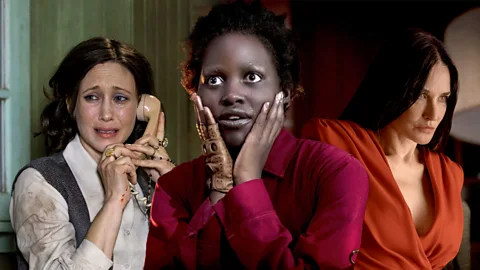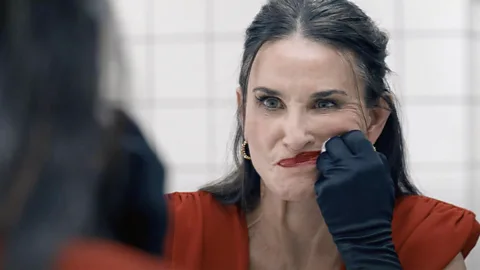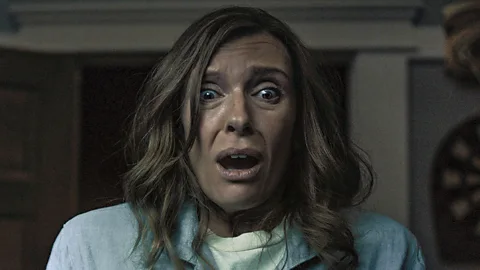Why horror performances deserve more awards

 BBC/ Alamy
BBC/ AlamyIf Demi Moore wins the best actress award for The Substance, it will be a landmark moment – outstanding performances in the horror genre are too often overlooked. Could that be set to change?
In 2024’s The Substance, irresistible temptation leads to unthinkable transformation. The gory flick includes all the hallmarks of a classic horror film: monsters, blood and an uneasy sense of suspense that keeps your eyes glued to the screen. Even come the literal bloodbath finale, it’s hard to look away.
This article contains spoilers for The Substance.
Love it or hate it, Coralie Fargeat’s grotesque, fairytale-gone-wrong is one of the year’s breakout films, starring Demi Moore as Elisabeth Sparkle, a former film star who gets fired from her current gig as a celebrity aerobics instructor as she turns 50. While critics and movie-goers agree that The Substance was one of the year’s most arresting box-office hits – rating the film 89% and 75% on Rotten Tomatoes, respectively – it wasn’t until Moore won the Golden Globe for best performance by a female actor in a motion picture – musical or comedy that murmurs about an awards sweep began to crescendo. Could a by-the-book scary, fantastical horror film win big at this year’s Oscars? It is nominated in five categories, including best picture and best actress for Moore.
 Alamy
AlamySo perhaps The Substance isn’t a classic horror film at all. The horror-comedy, deemed a “feminist masterpiece” by some, hinges on a familiar premise with a grotesque twist: what would happen if we got everything we wanted after all? After Elisabeth takes a mysterious lime-green “substance”, she gives birth to a younger, bouncier version of herself – but not without this process taking a toll on the middle-aged celebrity’s body. The film is an especially prescient take on womanhood, beauty and ageing in today’s image-obsessed culture. Moore herself has touched upon why the acclaim from this film has meant so much to her, sharing that her Golden Globe win was the first time she “ever won anything as an actor” in a career spanning more than 45 years.
A win for her at this year’s Oscars, coupled with her first nomination in a five-decade career, would be momentous. But it would be an even bigger moment if The Substance won best picture – it is one of only seven horror films ever nominated for the award, and if it won, it would become one of only of two to do so.
Demi Moore has explicitly mentioned the lack of recognition and accolades that horror films (and the people who make them) receive from the awards system and the wider establishment. While accepting her award for best actress at the 2025 Critic’s Choice Awards for her performance in The Substance, Moore told the audience: “I am so grateful, not just for my performance, but that you have highlighted this film, this genre. Normally, horror films are overlooked, and not seen for the profundity that they can hold.” With this year’s awards season, there seems to be a cultural shift happening, and Moore may be at the forefront of change.
It’s been 33 years since the first (and last) film in the horror genre, The Silence of the Lambs, took the top prize. The 1992 film won best picture, as well as best adapted screenplay, best director (Jonathan Demme), best actor (Anthony Hopkins), and best actress (Jodie Foster). In a league of its own, The Silence of the Lambs is also only one of three films to ever sweep the “big five” categories (along with It Happened One Night and One Flew Over the Cuckoo’s Nest). While no other horror film has ever taken home best picture, a few great horror acting turns have been awarded throughout the years, most notably Ruth Gordon in 1969 for Rosemary’s Baby, Kathy Bates in 1991 for Misery, and Natalie Portman in 2011 for Black Swan.
 Alamy
AlamyAnd yet, for every stupendous and skin-crawling performance recognised by the Academy, there were many, many more snubbed; recognition for horror acting remains rare, relative to performances in other genres. Despite Ari Aster’s Hereditary (2018) receiving 52 award wins and 113 nominations according to IMDB, including numerous accolades for star Toni Collette, neither she nor the film as a whole earned a single nomination at the 2019 Oscars or Golden Globes. Director and horror academic Rebekah McKendry underscores why Collette’s performance was so captivating: “She embodied so much in that film, and all of it was brilliant – a stressed-out mum in mid-life crisis; the trauma of losing a parent and then a child, being the victim of something otherworldly she can’t fully explain, and then shifting to becoming the monster herself.”
Why horror films are snubbed
Film critics and fans over the years have agreed that there’s one main reason for the widespread snubbing of horror actors – a prejudice against the genre. “Many people disregard horror films as b-grade, campy and silly,” McKendry tells the BBC. “Because of this, many people don’t view horror films as sources of art and social messages. It’s a genre many audiences are afraid to approach in general, let alone celebrate with major awards.” In The Substance, the message about societal pressures on women is clear, which may well boost the film’s chances of being rewarded by the Academy.
Indeed, the evidence suggests Oscars do enjoy horror films with a strong social message – see 2017’s spooky satire Get Out, for which Jordan Peele became the first black person to win the award for best original screenplay. (The film was also nominated that year for best actor, best director, and best picture.)
It may also partly explain the Oscar snub for Lupita Nyong’o’s acclaimed performance in the 2019 horror film Us, also directed by Jordan Peele. History had been made with his win for Get Out, and though Us can be analysed through themes of class in the US, it did not have nearly as much overt social commentary.
Film critic Kim Newman believes that a great horror film is one that resonates with the general public, becoming “part of the general conversation or lasting pop culture”. But he adds that the best horror films also tend to be “divisive” – and therefore even the most arresting films won’t get votes from the many people who hate them. “Horror kind of needs to be edgy, and that’s not often where awards go,” Newman tells the BBC.
When it comes to horror acting, meanwhile, there is no doubt that it can push performers to their limits in a way that deserves more recognition. Acting coach Scott Sedita highlights the intense physicality behind many great horror performances. Citing Vera Farmiga’s performance in 2013 horror The Conjuring as an example, Sedita tells the BBC, “There was a certain skill in [her] screams – there’s a lot of energy.” A great horror performance often requires an actor not only to tap very strongly into the viewer’s emotions, but also show great stamina and lack of vanity in putting themselves through the wringer in ways that enhance the viewers’ sensory experience. While many viewers can relate to Elisabeth Sparkle’s emotional scenes of body dysmorphia early on, it’s Demi Moore’s evolution into an elderly, disfigured version of her character where the film really takes flight.
 Getty Images
Getty ImagesAfter attempting to put an end to her younger alter ego with a termination serum, things then really go haywire for Elisabeth, with the emergence of Monstro ElisaSue – a colossal, grotesque mashup of the two main characters. The prosthetics at this point in the film are definitely ridiculous – including a revolting excess of teeth, breasts and eyes – but the absurdity drives home the point of the film. Beauty standards are arbitrary and absurd. We should laugh at them, instead of choosing to fulfil them with extreme and dangerous measures. The Substance is a cautionary tale that points a mirror at the viewer when we find ourselves looking at Monstro ElisaSue in disgust: is she the monster, or am I, for thinking that way? It’s extremely difficult to balance horror film acting while trying to connect with the audience – something many fail to do successfully. The fact that so many moviegoers empathised with Elisabeth’s final form is a testament to the performance.
So where does the genre go next? Should every horror film moving forward try to appease the masses, or stick to innovative storytelling that continues to shock and awe? The answer may lie in the genre’s only best picture Oscars winner, and the films thematic diversity. No one can deny that The Silence of the Lambs belongs in the horror genre – however, film scholars frequently point out that the movie was sometimes labelled something else. “What we often see happen is that when a horror film does garner upper-level achievements, its genre in media coverage will shift,” McKendry says. “In the case of Silence of the Lambs, it was sometimes called a ‘crime film’ instead of horror.” While the difference between horror, thriller, crime and action might sound like splitting hairs, expanding the categorisation of a film can alter its perception in the mainstream – and propel it to award-winning status.
Source link





